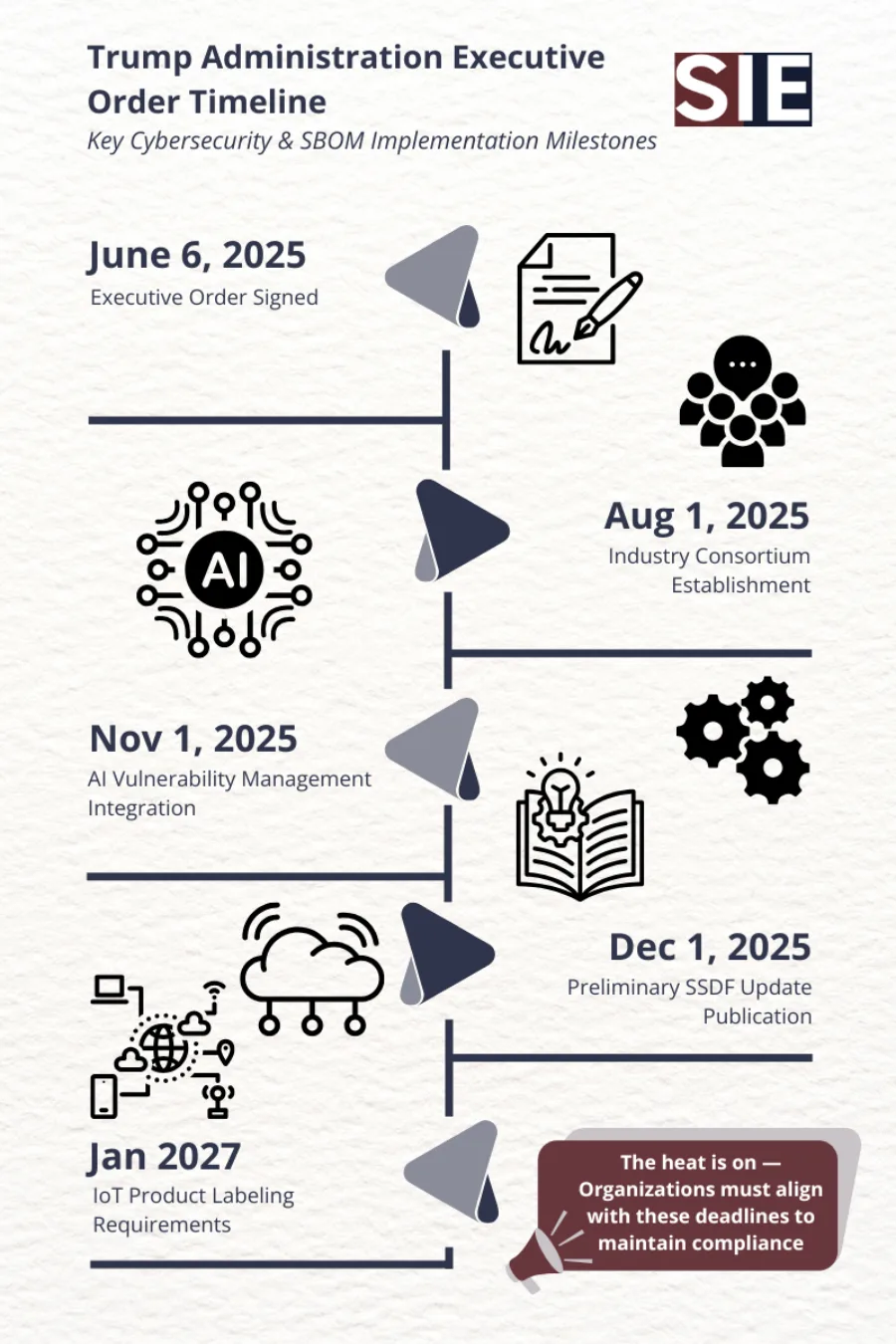Trump Administration Doubles Down on SBOM Security: What the Latest Executive Order Means for Your Organization
The cybersecurity landscape shifted significantly on June 6, 2025, when
President Trump signed a comprehensive executive
order strengthening the nation's cybersecurity posture. While Software Bill
of Materials (SBOMs) aren't explicitly mentioned by name, the order reinforces
critical secure software development frameworks that make SBOM implementation
more essential than ever for federal agencies and commercial organizations
alike.
Key Changes That Impact Software Supply Chain Security
The executive order amends previous cybersecurity directives with several
provisions that directly affect how organizations approach software supply
chain security:
Enhanced Secure Software Development Framework (SSDF) Requirements
The order directs the Secretary of Commerce, through NIST, to establish an
industry consortium by August 1, 2025, focused on implementing secure software
development practices based on NIST Special Publication
800-218. This framework inherently includes SBOM practices as a cornerstone
of secure software development.
Updated SSDF Guidelines Coming
By December 1, 2025, NIST must publish a preliminary update to the SSDF that
includes "practices, procedures, controls, and implementation examples
regarding the secure and reliable development and delivery of software."
This update will likely strengthen SBOM requirements and provide clearer
implementation guidance for organizations.
AI Software Vulnerability Management
Perhaps most notably for the evolving cybersecurity landscape, the order
requires federal agencies to incorporate AI software vulnerabilities into
existing vulnerability management processes. This expansion makes comprehensive
software inventory tracking—the core purpose of SBOMs—even more critical.
Why These Changes Matter for Your Organization
The strengthened focus on secure software development frameworks signals the
federal government's commitment to supply chain transparency and security.
Organizations that haven't yet implemented robust SBOM practices may find
themselves at a significant disadvantage when competing for federal contracts
or meeting compliance requirements.
Regulatory Alignment Becomes Critical
With the executive order reinforcing NIST frameworks that incorporate SBOM
practices, organizations must align their software security strategies with
evolving federal standards. The executive order's emphasis on "secure and
reliable development and delivery of software" directly correlates with
SBOM capabilities.
Post-Quantum Cryptography Preparations
The order also addresses quantum computing threats, requiring agencies to
support Transport Layer Security protocol version 1.3 by January 2030.
Organizations with comprehensive SBOMs will be better positioned to identify
and update cryptographic implementations across their software portfolios.
Turn Up the Heat on Your SBOM Strategy This Summer
As cybersecurity challenges intensify, organizations need practical guidance on implementing effective SBOM strategies. The SIE Group and Eracent are hosting an essential webinar, "Summer's Here & It's Heating Up: SBOM Smarts for Federal & Commercial Resilience,"
designed to help federal agencies and commercial organizations navigate these evolving requirements.
This exclusive session will explore how SBOMs strengthen security while addressing regulatory compliance, automation tools, and real-world implementation strategies. Whether you're a federal IT professional, commercial security team member, or compliance leader, this webinar provides actionable insights for enhancing your cybersecurity approach.
Key topics include:
- SBOM standards alignment with Executive Order 14028, NIST, and OMB mandates
- Automated SBOM management through Eracent's SBOM Manager
- Practical implementation examples and case studies
- Integration approaches for both federal and commercial environments
The webinar features expert presenters from The SIE Group, leading IT Asset Management experts serving federal and commercial clients, and Eracent, industry pioneers in SBOM management and software supply chain security solutions.
Take Action Before Summer Heat Peaks
The latest executive order makes clear that software supply chain security
isn't just a best practice—it's becoming a regulatory requirement.
Organizations that proactively implement comprehensive SBOM strategies will be
better positioned to meet evolving compliance demands and secure their software
ecosystems.
Don't let your organization fall behind in the rapidly evolving
cybersecurity landscape. Register
now for this essential webinar and gain the insights needed to strengthen
your software supply chain security before regulatory deadlines arrive.
The heat is on—make sure your SBOM strategy can handle the pressure.
